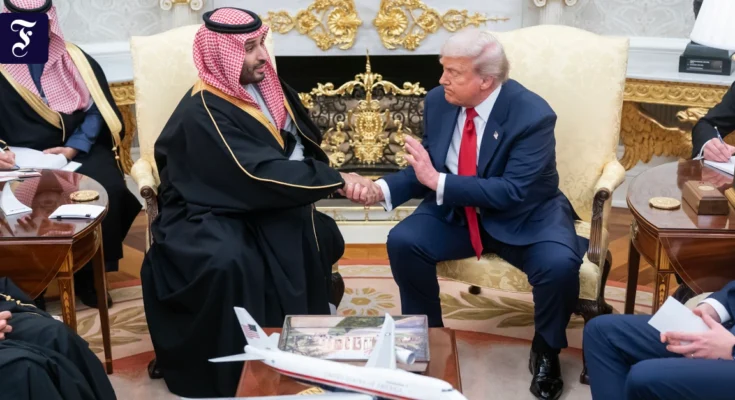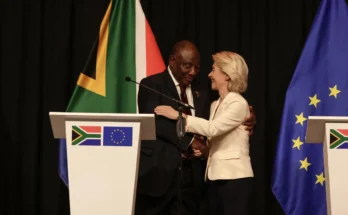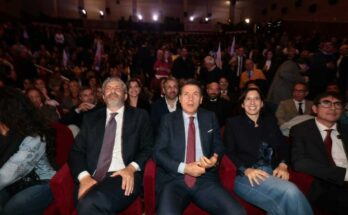The American media was shocked by Donald Trump’s reaction to ABC correspondent Mary Bruce’s question during the visit of Saudi Crown Prince Mohammed bin Salman. He asked about the murder of Saudi dissident and Washington Post reporter Jamal Kashoggi.
The journalist was tortured, killed and then dismembered by special forces at the Saudi consulate in Istanbul on October 2, 2018. “A lot of things happened,” Trump said when Bruce asked why he should believe bin Salman, who according to American intelligence, approved the killing. Trump said Kashoggi was “very controversial” and claimed bin Salman knew nothing about the killing. Instead, Trump attacked ABC, claiming the network was spreading “fake news” and calling it “one of the worst organizations in the news business.”
Trump wants media control like the Saudis do
The Post angrily rejected this “distortion,” writing that such legitimacy emboldens Bin Salman “and people like him because there are no real consequences to fear.” Trump’s guest, CNN host Anderson Cooper said afterward, “felt right at home” given the open threats against media organizations. “There is no press freedom in Saudi Arabia – according to Freedom House, the kingdom scores zero on a scale of one to four.”
This is not the first time Trump has made a name for himself by flattering autocrats and insulting US journalists. Moments earlier, aboard Air Force One, he pointed at Bloomberg reporter Catherine Lucey, who was asking about the publication of the Epstein dossier, with an outstretched index finger and the caption “Shut up! Quiet, piggy!” (Shut up, pig) offended.
By criticizing ABC reporter Mary Bruce’s “disobedience” and her “embarrassing of our guests with such questions” in the presence of Mohammed bin Salman, the US president once again underscored his idea of a press “at his service, silent when he demands it and when he finds the questions embarrassing,” Sarah Leah Whitson, associate director of Democracy for the Arab World Now founded by Kashoggi, told CNN. Although Trump doesn’t have the control over the media that the Saudis have, said CNN media analyst Brian Stelter, “he seems to hope to take revenge on the American media like a dictator would.”
A clear signal
Trump actually demanded that the head of the FCC’s media authority, Brendan Carr, consider revoking ABC’s broadcasting license “because your news is so false and false.” The FCC has no power in this regard – it distributes broadcast licenses to local broadcast stations, some of which are owned by ABC, but has no regulatory power over ABC itself. But Carr, as Trump discovered, was a willing proxy agent. Since his appointment by Trump in January, he has repeatedly intervened to align American television networks ABC, CBS and NBC, whose economic interests have sometimes depended on his position of authority.
Broadcasters need a “course correction,” Carr said; The public interest must finally be put forward again, rather than television which tends to have political nuances. In September, Carr signaled on ultra-right podcaster Benny Johnson’s show, “We can do this the easy way or the hard way,” that he would make life difficult for ABC stations if the network didn’t take “action on the Kimmel case” — referring to the late-night speaker who falsely implied in his monologue that Charlie Kirk’s killer was a political right-winger.
Nexstar and Sinclair Corporation, owners of many of the country’s TV stations, immediately boycotted Kimmel’s show; ABC suspended Kimmel for almost a week. Carr’s threat was effective because Nexstar and Sinclair are in the midst of negotiating a multibillion-dollar deal that must be approved by the FCC. When Trump called for late-night talker Seth Meyers to be fired from NBC a few days ago, Carr copied Trump’s post to his X account without comment. The stance is clear: NBC’s parent company, Comcast, is one of the companies interested in the Warner Bros. company. Discovery, which is up for sale – again under FCC scrutiny.
The media landscape depends on Trump
Carr’s role in Trump’s efforts to control the media goes beyond telling networks what to broadcast and who to fire, the Atlantic wrote. Instead, this creates a situation where this is no longer necessary.
Carr has suggested several times that ABC’s morning talk show “The View” should be punished. Joy Behar, one of the six moderators, responded to Trump’s claim that Obama had staged a coup against him, saying that Trump was just jealous because Obama was everything Trump was not — “slim, smart, attractive, happily married.” Carr later announced on Fox News that the network “faces a Colbert-like problem” if it continues to organize a “partisan circus.” In July, shortly after Trump demanded that late-night speaker and Trump critic Stephen Colbert be fired, CBS announced that Colbert’s show would end next May. It was a kowtow that served to smooth over the takeover of CBS’ parent company, Paramount, by billionaire and Trump friend Larry Ellison, or his son David. The deal is also subject to FCC approval.
The fact that the Ellison Group, now called Skydance Paramount, was one of the bidders for the Warner Bros. media group. Discovery, which owns news channel CNN, among other things, sparked concerns in the US media that the news landscape would continue to be under the influence of Trump and his associates. And Mohammed bin Salman could be involved in the future: As “Variety” reports, Larry Ellison and his son David are currently forming a consortium of investors from Saudi Arabia, Qatar and Abu Dhabi to make a $71 billion bid to acquire Warner Bros. Discovery.
Paramount denied the report as “grossly inaccurate,” but the Financial Times also reported on Ellison’s conversations with donors from Saudi Arabia and other Gulf countries. Iranian-American “Washington Post” journalist Jason Rezaian, who was imprisoned in Iran from 2014 to 2016 on espionage charges, said on CNN that it “really scared him” that the Saudis were trying to buy US media companies. Journalists in the US can still criticize the government. But his biggest concern is “the self-censorship that is starting to happen in our industry. And – really – the safety of the people who do this work.”



